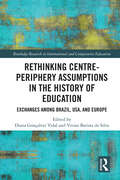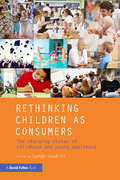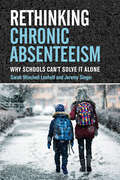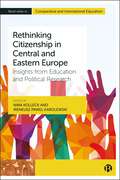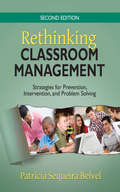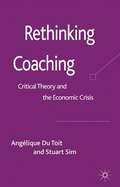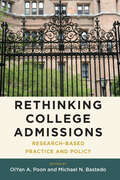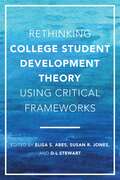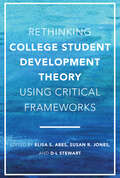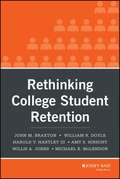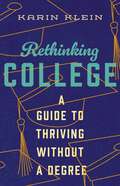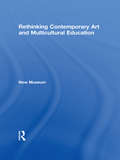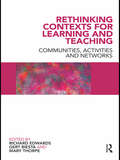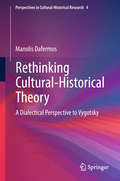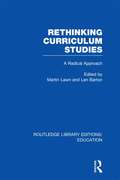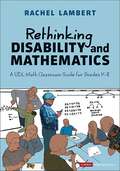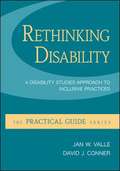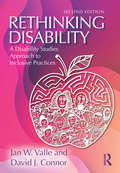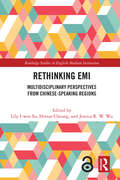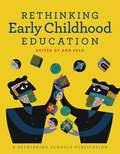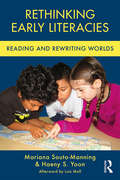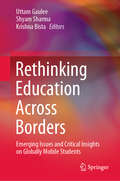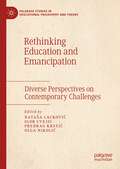- Table View
- List View
Rethinking Centre-Periphery Assumptions in the History of Education: Exchanges among Brazil, USA, and Europe (Routledge Research in International and Comparative Education)
by Diana Gonçalves Vidal Vivian Batista da SilvaThis collection encompasses a period that spans two centuries, in which Brazil serves as a point of departure and of arrival for the analyses of circuits that, intertwined within the national borders, stimulate the reflection about international transits, hybridizations, and appropriations in a process of transnational circulation of subjects and artifacts, in which pedagogical and social models and knowledges are not excluded. The chapters deal with voyages, trajectories, and exchanges, rethinking the beliefs that for a long time drove politicians, educators, and scholars in search of the best ways to construct national systems of education. Firstly, because they presupposed the existence of fixed and univocal relationships that start from the supposed center toward the regions perceived as peripheral, with no margin for examining the reverse circuit. Secondly, they elided the perception of those territories as transitory and resulting from historically shifting geographic and symbolic constructions. Lastly, they ratified the violence of the processes of exclusion based on the attribution of subalternities brought about by a historiographic narrative in education that presents itself as a reference.
Rethinking Children as Consumers: The changing status of childhood and young adulthood
by Cyndy HawkinsChildren are significant consumers of services such as health, welfare, educational institutions and the environment. Alongside this, the marketization of childhood means that children are exposed to advertising and marketing through a wide range of media on a daily basis. Examining key debates on children’s power, status and citizenship issues, it considers the wider implications of how consumerism impacts on children‘s health, well-being and life chances. This timely book explores childhood and consumerism through four key strands: children as consumers of services; children as consumers of space; the link between citizenship and consumption; the influences of the marketization of childhood. Rethinking Children as Consumers will be essential reading for students, researchers, practitioners and policy makers who are interested in the topic of consumerism across early childhood, childhood, youth and society.
Rethinking Chronic Absenteeism: Why Schools Can't Solve It Alone
by Sarah Winchell Lenhoff Jeremy SingerA call for community-based approaches to reducing the barriers that prevent regular attendance in K-12 schools
Rethinking Citizenship in Central and Eastern Europe: Insights from Education and Political Research (Bristol Studies in Comparative and International Education)
by Nina Kolleck and Ireneusz Pawel KarolewskiThis book delves into the intricate landscape of citizenship practices in Central and Eastern Europe, an area often overlooked in research. Through an interdisciplinary lens, the contributors explore how education and political participation shape these practices in a region marked by historical and social complexities. The book offers fresh insights into how citizenship is perceived and practiced, highlighting the role of civic education in fostering political engagement. By addressing both the challenges and opportunities of citizenship in this dynamic region, this volume contributes to broader debates on democracy and civic participation across Europe and beyond.
Rethinking Classroom Management: Strategies for Prevention, Intervention, and Problem Solving
by Ms Patricia L. BelvelProvides new real-life examples, intervention techniques, and ready-to-use worksheets for addressing potential problems before learning is disrupted and demonstrates ways to foster student leadership in your classroom.
Rethinking Coaching
by Ang�lique Du Toit Stuart SimCoaching is being proposed as the best method to encourage a change in the ideologies that have brought about the credit crunch. The authors' concern is to show how coaching can widen its intellectual range to become a progressively more effective technique within organizational life.
Rethinking College Admissions: Research-Based Practice and Policy
by OiYan A. Poon and Michael N. BastedoRethinking College Admissions probes the many facets of higher education admissions and translates research-backed insights into actionable strategies for innovative, equitable admissions practices.Edited by scholars OiYan A. Poon and Michael N. Bastedo, this collection gives readers an evidence-based understanding of postsecondary admissions practices and structures, exploring many factors that affect college access and educational equity in the United States. These collected essays from leading experts present boundary-pushing applied research on admissions, with implications for policy, practice, and leadership.The volume considers admissions issues from three angles. In the opening essays, contributors offer critical analyses of current admissions approaches in higher education, delineating the delicate balance of equity-building efforts and legal pressures. The contributors offer reflections on whether and how admissions systems further inclusion or inequality. They examine topics such as race-conscious admissions, holistic review without standardized test scores, and student test preparation. The volume&’s next part discusses the many different ways in which admissions work can be done, outlines ethical hazards, and considers potential areas for organizational change. The final essays provide inroads and examples for developing reciprocal relationships in research and practice for the future. They discuss promising approaches for advancing campus diversity, such as admissions lotteries, direct enrollment, and institutional promise programs for high-achieving students from low-income communities.A must-read for practitioners, policy makers, and anyone interested in gaining a better understanding of postsecondary admissions structures, including K–12 educators and counselors, advocacy groups, and students, this work supports data-informed approaches to higher education admissions.
Rethinking College Student Development Theory Using Critical Frameworks
by Susan R. Jones Elisa S. Abes D. L. StewartA major new contribution to college student development theory, this book brings “third wave” theories to bear on this vitally important topic for anyone working on campus today. The book has three sections: The first briefly introduces the third wave theories that have recently expanded the frame of the topic; the second uses those theories to focus on specific aspects of student development; and the third brings it all together with a few chapters that look at the implications for practice. The first section includes a chapter that provides an overview of the evolution of student development theories as well as chapters describing the critical and post structural theories most relevant to the next iteration of student development theory. These theories include critical race theory, queer theory, feminist theories, intersectionality, decolonizing/indigenous theories, and crip theories. These chapters also include a discussion of how each theory is relevant to the central questions of student development theory. The second section provides critical interpretations of the primary constructs associated with student development theory. These constructs and their related ideas include resilience, dissonance, socially constructed identities, authenticity, agency, context, development (consistency/coherence/stability), and knowledge (sources of truth and belief systems). Each chapter begins with brief personal narratives on a particular construct; the chapter authors then re-envision the narrative’s highlighted construct using one or more critical theories. The third section will focus on implications for practice. Specifically, these chapters will consider possibilities for how student development constructs re-envisioned through critical perspectives can be utilized in practice. The primary audience for the book is faculty members who teach in graduate programs in higher education and student affairs and their students. It may also be of interest to faculty and graduate students in psychology, sociology, and ethnic studies, as well as women’s, gender, and sexuality studies departments. The book will also be useful to practitioners seeking guidance in working effectively with students across the convergence of multiple aspects of identity and development.
Rethinking College Student Development Theory Using Critical Frameworks
by Elisa S. Abes, Susan R. Jones, D-L StewartA major new contribution to college student development theory, this book brings "third wave" theories to bear on this vitally important topic. The first section includes a chapter that provides an overview of the evolution of student development theories as well as chapters describing the critical and poststructural theories most relevant to the next iteration of student development theory. These theories include critical race theory, queer theory, feminist theories, intersectionality, decolonizing/indigenous theories, and crip theories. These chapters also include a discussion of how each theory is relevant to the central questions of student development theory. The second section provides critical interpretations of the primary constructs associated with student development theory. These constructs and their related ideas include resilience, dissonance, socially constructed identities, authenticity, agency, context, development (consistency/coherence/stability), and knowledge (sources of truth and belief systems). Each chapter begins with brief personal narratives on a particular construct; the chapter authors then re-envision the narrative’s highlighted construct using one or more critical theories. The third section will focus on implications for practice. Specifically, these chapters will consider possibilities for how student development constructs re-envisioned through critical perspectives can be utilized in practice. The primary audience for the book is faculty members who teach in graduate programs in higher education and student affairs and their students. The book will also be useful to practitioners seeking guidance in working effectively with students across the convergence of multiple aspects of identity and development.
Rethinking College Student Retention
by John M. Braxton Amy S. Hirschy William R. Doyle Harold V. Hartley III Willis A. Jones Michael K. MclendonDrawing on studies funded by the Lumina Foundation, the nation's largest private foundation focused solely on increasing Americans' success in higher education, the authors revise current theories of college student departure, including Tinto's, making the important distinction between residential and commuter colleges and universities, and thereby taking into account the role of the external environment and the characteristics of social communities in student departure and retention. A unique feature of the authors' approach is that they also consider the role that the various characteristics of different states play in degree completion and first-year persistence. First-year college student retention and degree completion is a multi-layered, multi-dimensional problem, and the book's recommendations for state- and institutional-level policy and practice will help policy-makers and planners at all levels as well as anyone concerned with institutional retention rates--and helping students reach their maximum potential for success--understand the complexities of the issue and develop policies and initiatives to increase student persistence.
Rethinking College: A Guide to Thriving Without a Degree
by Karin Klein"A valuable reassessment of America's educational system." —PUBLISHERS WEEKLYWhat if you didn't have to go to college?You may have heard that a college degree is the only path to success. But many college graduates end up mired in debt and underemployed, working jobs that don't even require a degree. The good news? There are many promising career options for those who don't want to or can't attend college.In Rethinking College, award-winning journalist Karin Klein sets out a new path for our country's students and their families. Klein examines why the traditional college-for-all model has been overhyped and is growing less relevant, then shares practical advice and real-world examples of exactly how others have succeeded without a four-year degree.Discover an abundance of alternative paths, including white-collar apprenticeships, certificate programs, entrepreneurship, creative careers, residential public-service work, and more.Klein will guide you step-by-step toward a broad range of fulfilling and well-paid careers that don't require a degree—ranging from pilots, costume designers, influencers, writers, computer programmers, corporate headhunters, film editors, and so many more. The breadth of possibilities is wider than you think!Rethinking College is perfect for:Those who are unsure of their next education or career steps.Those looking to make a job pivot.Parents seeking guidance for their child.School counselors who want to offer their students more and better options. Don't just go to college because everyone says you have to—find the path that's right for you. It's out there.
Rethinking Contemporary Art and Multicultural Education
by New MuseumFor over a decade, Contemporary Art and Multicultural Education has served as the guide to multicultural art education, connecting everyday experience, social critique, and creative expression with classroom learning. The much-anticipated Rethinking Contemporary Art and Multicultural Education continues to provide an accessible and practical tool for teachers, while offering new art, essays, and content to account for transitions and changes in both the fields of art and education. A beautifully-illustrated collaboration of over one hundred artists, writers, curators, and educators from in and around the contemporary art world, this volume offers thoughtful and innovative materials that challenge the normative practices of arts education and traditional art history. Rethinking Contemporary Art and Multicultural Education builds upon the pedagogy of the original to present new possibilities and modes of understanding art, culture, and their relationships to students and ourselves. The fully revised second edition provides new theoretical and practical resources for educators and students everywhere, including: Educators' perspectives on contemporary art, multicultural education, and teaching in today’s classroom Full-color reproductions and writings on over 50 contemporary artists and their works, plus an additional 150 black-and-white images throughout Lesson plans for using art to explore topical issues such as activism and democracy, conflict: local and global, and history and historicism A companion website offering over 250 color reproductions of artwork from the book, a glossary of terms, and links to the New Museum and G: Class websites---www.routledge.com/textbooks/9780415960854.
Rethinking Contexts for Learning and Teaching: Communities, Activites and Networks
by Richard Edwards Gert Biesta Mary ThorpeNow that learning is seen as lifelong and lifewide, what specifically makes a learning context? What are the resultant consequences for teaching practices when working in specific contexts? Drawing upon a variety of academic disciplines, Rethinking Contexts for Learning and Teaching explores some of the different means of understanding teaching and learning, both in and across contexts, the issues they raise and their implications for pedagogy and research. It specifically addresses What constitutes a context for learning? How do we engage the full resources of learners for learning? What are the relationships between different learning contexts? What forms of teaching can most effectively mobilise learning across contexts? How do we methodologically and theoretically conceptualise contexts for learning? Drawing upon practical examples and the UK’s TLRP, this book brings together a number of leading researchers to examine the assumptions about context embedded within specific teaching and learning practices. It considers how they might be developed to extend opportunity by drawing upon learning from a range of contexts, including schools, colleges, universities and workplaces.
Rethinking Cultural-Historical Theory: A Dialectical Perspective To Vygotsky (Perspectives In Cultural-historical Research Ser. #4)
by Manolis DafermosThis book is an exploration of science in the making. It offers readers the opportunity to critically reflect on the process of development of Vygotsky's research program from the perspective of dialectics, focusing on the dramatic process of building and rebuilding cultural historical theory. Vygotsky's creative and dramatic journey is no less important than the concrete results of his research. An epistemological and historical investigation of the formulation of cultural historical theory sheds light on the process of knowledge production and reveals hidden dimensions of creativity in science.
Rethinking Curriculum Studies (Routledge Library Editions: Education)
by Stuart J. BarnesThis book reappraises the British and American experience in curriculum studies, the curious way in which it has been dominated by certain ideas and introduces the reader to alternative ways of perceiving, defining and approaching its problems. It provides a radical critique of the whole area, presenting both Marxist and phenomenological perspectives on the current dilemmas that teachers face. The book argues that in order to understand the problems teachers face in coping with the curriculum, we must look at the situation from the point of view of the individual rather than prescribing a norm for all teachers. The dynamic relationship between the individual and the collective and the teacher and the state is one of the fundamental issues in solving the present problems in curriculum studies. The book focuses on this central problem and suggests a variety of ways in which new solutions may be found.
Rethinking Difference in Music Scholarship
by Olivia Bloechl Melanie Lowe Jeffrey Kallberg Olivia Bloechl Melanie LoweTwo decades after the publication of several landmark scholarly collections on music and difference, musicology has largely accepted difference-based scholarship. This collection of essays by distinguished contributors is a major contribution to this field, covering the key issues and offering an array of individual case studies and methodologies. It also grapples with the changed intellectual landscape since the 1990s. Criticism of difference-based knowledge has emerged from within and outside the discipline, and musicology has had to confront new configurations of difference in a changing world. This book addresses these and other such challenges in a wide-ranging theoretical introduction that situates difference within broader debates over recognition and explores alternative frameworks, such as redistribution and freedom. Voicing a range of perspectives on these issues, this collection reveals why differences and similarities among people matter for music and musical thought.
Rethinking Disability and Mathematics: A UDL Math Classroom Guide for Grades K-8 (Corwin Mathematics Series)
by Rachel LambertEvery child has a right to make sense of math, and to use math to make sense of their worlds. Despite their gifts, students with disabilities are often viewed from a deficit standpoint in mathematics classrooms. These students are often conceptualized as needing to be fixed or remediated. Rethinking Disability and Mathematics argues that mathematics should be a transformative space for these students, a place where they can discover their power and potential and be appreciated for their many strengths. Author Rachel Lambert introduces Universal Design for Learning for Math (UDL Math), a way to design math classrooms that empowers disabled and neurodiverse students to engage in mathematics in ways that lead to meaningful and joyful math learning. The book showcases how UDL Math can open up mathematics classrooms so that they provide access to meaningful understanding and an identity as a math learner to a wider range of students. Weaved throughout the book are the voices of neurodiverse learners telling their own stories of math learning. Through stories of real teachers recognizing the barriers in their own math classrooms and redesigning to increase access, the book: Reframes students with disabilities from a deficit to an asset perspective, paving the way for trusting their mathematical thinking Offers equitable math instruction for all learners, including those with disabilities, neurodiverse students, and/or multilingual learners Applies UDL to the math classroom, providing practical tips and techniques to support students′ cognitive, affective, and strategic development Immerses readers in math classrooms where all students are engaged in meaningful mathematics, from special education day classes to inclusive general education classrooms, from grades K-8. Integrates research on mathematical learning including critical math content such as developing number sense and place value, fluency with math facts and operations, and understanding fractions and algebraic thinking. Explores critical issues such as writing IEP goals in math This book is designed for all math educators, both those trained as general education teachers and those trained as special education teachers. The UDL Math approach is adapted to work for all learners because everyone varies in how they perceive the world and in how they approach mathematical problem solving. When we rethink mathematics to include multiple ways of being a math learner, we make math accessible and engaging for a wider group of learners.
Rethinking Disability and Mathematics: A UDL Math Classroom Guide for Grades K-8 (Corwin Mathematics Series)
by Rachel LambertEvery child has a right to make sense of math, and to use math to make sense of their worlds. Despite their gifts, students with disabilities are often viewed from a deficit standpoint in mathematics classrooms. These students are often conceptualized as needing to be fixed or remediated. Rethinking Disability and Mathematics argues that mathematics should be a transformative space for these students, a place where they can discover their power and potential and be appreciated for their many strengths. Author Rachel Lambert introduces Universal Design for Learning for Math (UDL Math), a way to design math classrooms that empowers disabled and neurodiverse students to engage in mathematics in ways that lead to meaningful and joyful math learning. The book showcases how UDL Math can open up mathematics classrooms so that they provide access to meaningful understanding and an identity as a math learner to a wider range of students. Weaved throughout the book are the voices of neurodiverse learners telling their own stories of math learning. Through stories of real teachers recognizing the barriers in their own math classrooms and redesigning to increase access, the book: Reframes students with disabilities from a deficit to an asset perspective, paving the way for trusting their mathematical thinking Offers equitable math instruction for all learners, including those with disabilities, neurodiverse students, and/or multilingual learners Applies UDL to the math classroom, providing practical tips and techniques to support students′ cognitive, affective, and strategic development Immerses readers in math classrooms where all students are engaged in meaningful mathematics, from special education day classes to inclusive general education classrooms, from grades K-8. Integrates research on mathematical learning including critical math content such as developing number sense and place value, fluency with math facts and operations, and understanding fractions and algebraic thinking. Explores critical issues such as writing IEP goals in math This book is designed for all math educators, both those trained as general education teachers and those trained as special education teachers. The UDL Math approach is adapted to work for all learners because everyone varies in how they perceive the world and in how they approach mathematical problem solving. When we rethink mathematics to include multiple ways of being a math learner, we make math accessible and engaging for a wider group of learners.
Rethinking Disability: A Disability Studies Approach to Inclusive Practices
by Jan Valle David ConnorIn a series aimed at pre-service and beginning in-service teachers that is meant to boost teacher retention, this volume by Valle (City College, City U. of New York) and Conner (Hunter College, City U. of New York) brings together theory and practice in explaining how and why to implement inclusive education. They discuss inclusion through the frame of disability studies in education, which offers new ways to think about disability as a marker of identity and inclusive practices through a social model. They address the effects of teachers' knowledge, beliefs, and values on practice; misperceptions of disability; problems with the medical model of disability; how to create inclusive classrooms through classroom culture, assessment, and co-teaching; and acknowledging disability as part of diversity. Annotation ©2010 Book News, Inc. , Portland, OR (booknews. com)
Rethinking Disability: A Disability Studies Approach to Inclusive Practices
by David J. Connor Jan W. ValleNow in its second edition, Rethinking Disability introduces new and experienced teachers to ethical framings of disability and strategies for effectively teaching and including students with disabilities in the general education classroom. Grounded in a disability studies framework, this text’s unique narrative style encourages readers to examine their beliefs about disability and the influence of historical and cultural meanings of disability upon their work as teachers. The second edition offers clear and applicable suggestions for creating dynamic and inclusive classroom cultures, getting to know students, selecting appropriate instructional and assessment strategies, co-teaching, and promoting an inclusive school culture. This second edition is fully revised and updated to include a brief history of disability through the ages, the relevance of current educational policies to inclusion, technology in the inclusive classroom, intersectionality and its influence upon inclusive practices, working with families, and issues of transition from school to the post-school world. Each chapter now also includes a featured "voice from the field" written by persons with disabilities, parents, and teachers.
Rethinking EMI: Multidisciplinary Perspectives from Chinese-Speaking Regions (Routledge Studies in English-Medium Instruction)
by Su, Lily I-wenDue to the competitive edge it confers on students, educational institutions, and non-English speaking nations in a globalized economy, English as a medium of instruction (EMI) has been gaining popularity in tertiary education in non-native English-speaking (NNES) countries. Institute-wide EMI implementation has often been imposed by top-down decisions, in combination with the optimistic view that the horse should always be placed before the cart. However, emerging evidence suggests that the delivery of such programs to NNES students has led to new pedagogical challenges and learning problems that go beyond the scope of language learning and teaching and deserve immediate attention. For example, how would an instructor respond to situations in which students’ learning of content is compromised by their limited language proficiency? This book draws on the current practice of EMI in diverse disciplines and university settings and examines how these new pedagogical and learning issues can be addressed. The discussion also involves a reflection on the essence of EMI in relation to the use of the first language (L1) as the medium of instruction in tertiary education. In addition, the book includes discussion about how to ensure and maintain the quality of EMI programs and assess the readiness of stakeholders for such programs, which include administrators, teachers, and students. The discussion is led by exemplars in Hong Kong and Taiwan, where the majority of students are native Chinese speakers, in the hope of developing critical perspectives and practical guidelines as references for EMI in other NNES settings.
Rethinking Early Childhood Education
by Ann PeloIt shows how educators can nurture empathy, ecological consciousness, curiosity, collaboration, and activism in young children. It invites readers to rethink early childhood education, reminding them that it is inseparable from social justice and ecological education. An outstanding resource for childcare providers, early-grade teachers, and teacher education and staff development programs.
Rethinking Early Literacies: Reading and Rewriting Worlds (Changing Images of Early Childhood)
by Mariana Souto-Manning Haeny S. YoonRethinking Early Literacies honors the identities of young children as they read, write, speak, and play across various spaces, in and out of pre/school. Despite narrow curricular mandates and policies, the book highlights the language resources and tools that children cultivate from families, communities, and peers. The chapters feature children’s linguistic flexibility with multiple languages, creative appropriation of popular culture, participation in community literacy practices, and social negotiation in the context of play. Throughout the book, the authors critically reframe what it means to be literate in contemporary society, specifically discussing the role of educators in theorizing and rethinking language ideologies for practice. Issues influencing early childhood education in trans/national contexts are forefronted (e.g. racism, immigration rights, readiness) throughout the book, with a call to support and sustain communities of color.
Rethinking Education Across Borders: Emerging Issues and Critical Insights on Globally Mobile Students
by Shyam Sharma Krishna Bista Uttam GauleeThis book focuses on critical issues and perspectives concerning globally mobile students, aspects that have grown in importance thanks to major geopolitical, economic, and technological changes around the globe (i.e., in and across major origins and destinations of international students). Over the past few decades, the field of international higher education and scholarship has developed robust areas of research that guide current policy, programs, and pedagogy. However, many of the established narratives and wisdoms that dominate research agendas, scope, and foci have become somewhat ossified and are unable to reflect recent political upheavals and other changes (e.g. the Brexit, Trump era, and Belt and Road Initiative) that have disrupted a number of areas including mobility patterns and recruitment practices, understanding and supporting students, engagement of global mobile students with their local counterparts, and the political economy of international education at large. By re-assessing established issues and perspectives in light of the emerging global/local situations, the contributing authors – all experts on international education – share insights on policies and practices that can help adapt to emerging challenges and opportunities for institutions, scholars, and other stakeholders in international higher education. Including theoretical, empirical, and practitioner-based methods and perspectives provided by scholars from around the world, the book offers a unique and intriguing resource.
Rethinking Education and Emancipation: Diverse Perspectives on Contemporary Challenges (Palgrave Studies in Educational Philosophy and Theory)
by Nataša Lacković Igor Cvejic Predrag Krstić Olga NikolićThis edited collection responds to the contemporary need for deeper analysis and rethinking of the relation between education and emancipation in a world beset by social, digital, educational and ecological crises. Among the diverse interdisciplinary perspectives explored are: rethinking the Anthropocene in the time of environmental emergency, the concept of relational thinking as emancipatory practice and a more encompassing concept of relational pedagogy that includes questions about the environment and digitalisation, the notion of indoctrination from the perspective of political education, reconnecting with the body as a form of emancipatory education and how schools reproduce socio-cultural ideologies in synergy with material and visual culture. The book chapters also consider the role of social media, postcolonialism and feminism in understanding emancipatory education and a historical reception of John Dewey’s ideas in other than Western contexts. This volume will be of interestto those seeking well-known as well as further and novel acquaintance with the philosophical and critical issues surrounding different forms and ideas of emancipation and/or/through education, including related practical propositions and examples. Educators, scholars in education, social justice, philosophy, sociology and curriculum developers will find this collection valuable in contemplating, practising and theorising the futures of emancipatory education across contexts and themes.
